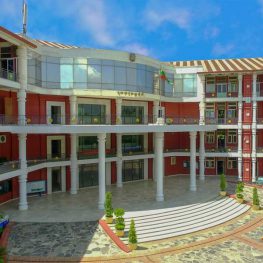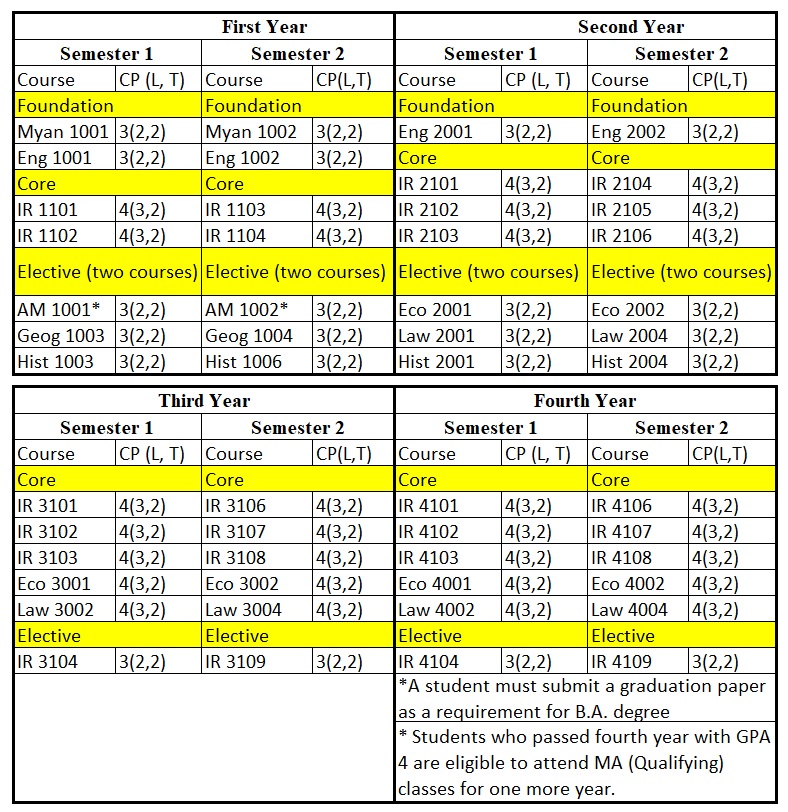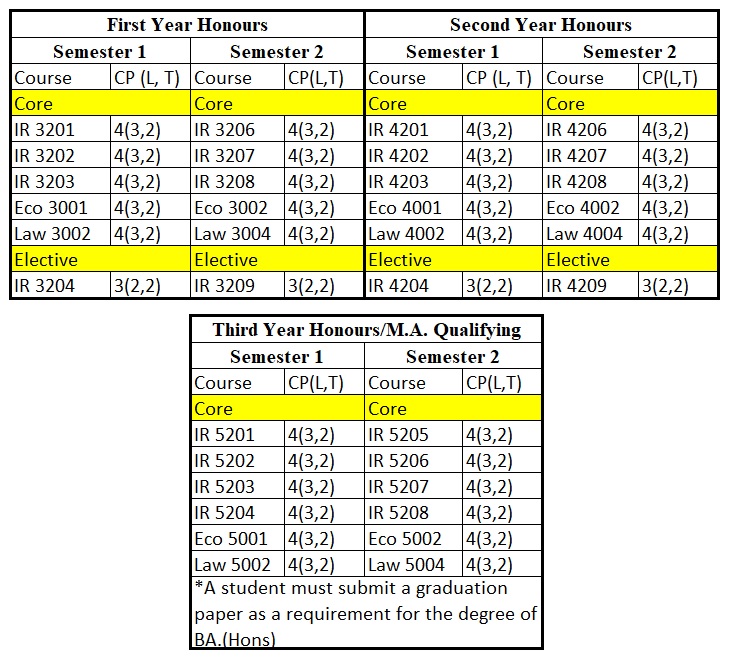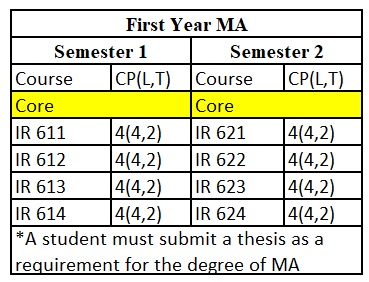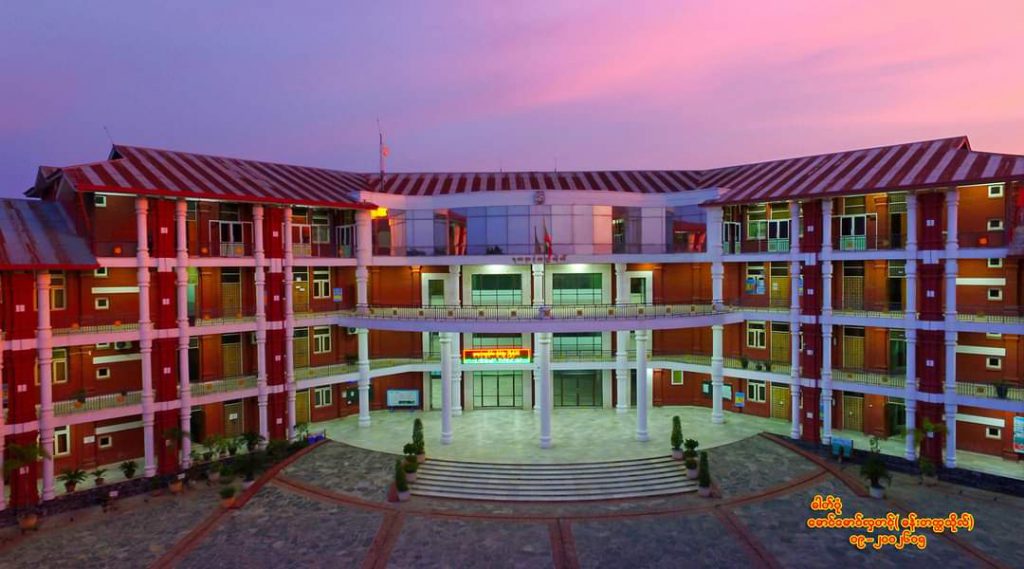Categories
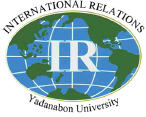 Department of International Relations
Department of International Relations
Staff
| Professor | – | 3 |
| Associate Professor | – | 2 |
| Lecture | – | 5 |
| Assistant Lecturer | – | – |
| Tutor | – | 2 |
| Office Staff | – | 1 |
| Total | – | 13 |
History of the Department
The origin of the Department of International Relations in the Yadanabon University started in the academic year 2000-2001. Rector U Win Maung and Pro-rector U Than Nwe were behind the establishment of the Department. The department of International Relations offers BA, BA(Hons), BA(Qualified) and MA programmes in International Relations.
Vision
- To produce highly-trained intellectuals who are proficient in international analysis and foreign policy decision making as well as can preserve the interests of their own nation
Mission
- To produce qualified students with remarkable range of undergraduate, post-graduate and professional programs built on a strong foundation of the discipline of International Relations
- To yield students with critical and creative thinking as well as problem solving skills
- To enhance the utility of textbooks and resources comparing with regional and international universities
Programs Offered
| BA. / BA. (Hons) in International Relations |
| MA in International Relations |
Curriculum
BA in International Relations
BA. (Hons) in International Relations
Students who passed second year with GPA 4 & above are eligible to attend BA. (Honours) classes for three more years. After they finished successfully, they earned BA. (Hons) degree majoring in International Relations.
MA in International Relations
Students who passed third year Honours with GPA 4 & above are eligible to attend MA classes for two more years. After they finished successfully with the submission of a thesis which was written during the second year MA, they earned MA degree majoring in International Relations.
Descriptions Modules Offered
The course aims to introduce the ideas and thoughts by the great political thinkers. It also highlights the importance and applicability of ancient philosophy in analyzing current national, regional and international issues.
The course aims to explain the interactions of states and non-state actors in the global interstate system. It gives students to know important issues such as war and peace, mutual security, disarmament, international law and trade and peaceful resolution of interstate disputes. The course aims to give students an introduction to numerous elements of economic factors and the role of MNC in IR.
The course aims to give students an introduction to the attribute of the State in International Relations. It assists students to distinguish state sovereignty and forms of state. The course ensures that students to know nature and functions of the constitution.
The course aims to give students to know about the background history, political processes, political parties, governmental structure, foreign relations of Southeast Asian States. It gives students an understanding of the concept of Southeast Asian Region.
The course aims to give students an introduction to post World War II global politics. It gives students to know a brief introduction to the ideological conflicts between the United States of America and the Soviet Union.
The course aims to give students an introduction to the political culture of the US. It makes students familiar with the cooperative Federalism and New Federalism. The course encourages students to analyze three branches of US government and features of the election system.
The course aims to assist the students in gaining the understanding and basic knowledge about the current political, economic and environmental issues. It makes students the awareness of the current domestic and international issues and the ways and methods to solve these issues.
The course aims to give students an understanding of constitutional framework in Myanmar. It ensures that students to know the successive Myanmar’s governmental structures. It makes students familiar with Myanmar’s political systems and Myanmar Hluttaw’s structure.
The course aims to gain knowledge of the historical, cultural and political process of the Middle East. It shares information about the enormous histories and diverse people of the region. It gives students to learn the Middle East as an important source of global economic resources.
The course aims to explain the developing friendly relations with all countries of the world, especially major powers and immediate neighbours. It provides students to study the establishment of peaceful relations between countries through negotiating trade deals, discussing mutual problems, implementing new policies, and tackling disputes.
This course will provide an opportunity for participants to establish or advance their understanding of research through critical exploration of research language, ethics, and approaches. The course introduces the language of research, ethical principles and challenges, and the elements of the research process within quantitative, qualitative and mixed methods approaches.
The course aims to give students to know about the politics of Southeast Asian States. It gives students an understanding of the concept of Southeast Asian Region and the position of ASEAN. It provides students to know disputes and conflicts between Southeast Asian Countries and other countries. The course enables students to know transnational crime between Southeast Asian States and other countries.
The course aims to give students an introduction to basic concepts of IR Theories. It makes students familiar with mainstream theories, the middle ground theories and critical theories. The course ensures students to know exactly Philosophic roots of critical theory and level of analysis.
The course aims to give students an understanding of East Asia’s political systems. It ensures students to learn about East Asia’s governmental structure. The course assist students to know about the systems of political parties of East Asia.
The course aims to know conflict management strategies (patterns of behaviour, new ideas, cooperation, solutions). It also elaborates students to produce mutually beneficial outcomes in managing conflicts.
This course will provide an opportunity for participants to establish or advance their understanding of research through critical exploration of research language, ethics, and approaches. The course helps the students to write graduation papers by applying the language of research, ethical principles and the elements of the research process within quantitative, qualitative and mixed methods approaches.
The course aims to highlight the concept of foreign policy and to predict international political behavior through geographical variables. It aims to investigate the complex relations between geography and international politics and power politics. It also aims to apply the analytical and theoretical tools of geopolitics in the contemporary international system.
The course aims to explore the security studies through two different domains: national security and human security. It also entails how to build sustainable communities that are inclusive, secure and sensitive to needs of the citizens. It emphasizes on human security based on a multi- sectoral understanding of insecurities and a broadened understanding of threats and their possible causes related to economic, food, health, environmental, personal, community and political security
The course aims to highlight the relations between the Asia-Pacific and the rest of the world and the sub-regional, regional and global significance of international affairs in the Asia Pacific. It also educates the students with general issues and theories of international relations that have a bearing on one or more countries of the Asia-Pacific
The course aims to focus on South Asia’s strategic geography, geopolitical dynamics and the inter-relationship of each South Asian country. It elaborates China-India rivalry and the status of US-Russia influence in South Asia.
This course will highlight a broader knowledge and development of theories and approaches that have been applied in international relations. It will focus on solving current international issues with the use of mainstream theories and approaches as well as critical ones.
The course aims to give students an understanding to the concept of international political economy. It highlights mutual integration between political and international economies. The course ensures students to know contending perspective of IPE and global North- South problems in IPE.
The course aims to highlight major geopolitical and geostrategic characteristics of Central Asia. The course provides broad aspects of American and Russian policy towards Central Asia. It emphasizes economic cooperation roadmap among China, Japan and Korea in Central Asia.
The course aims to introduce ecological issues happening in the era of globalization. It adds insights to solve those issues and informs both positive and negative impacts of globalization on the environment.
